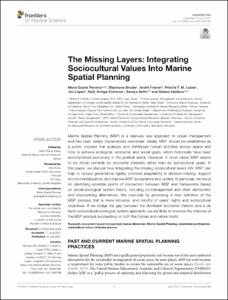The Missing Layers: Integrating Sociocultural Values Into Marine Spatial Planning.

View/
Average rating
votes
Date
2021Author
Pennino, Maria Grazia
Brodie, Stephanie
Frainer, André
Lopes, Priscila F. M.
Lopez, Jon
Ortega-Cisneros, Kelly
Selim, Samiya
Vaidianu, Natasa
Metadata
Show full item recordAbstract
Marine Spatial Planning (MSP) is a relatively new approach to ocean management
and has been widely implemented worldwide. Ideally, MSP should be established as
a public process that analyzes and distributes human activities across space and
time to achieve ecological, economic and social goals, which historically have been
accomplished exclusively in the political arena. However, in most cases MSP seems
to be driven primarily by economic interests rather than by sociocultural goals. In
this paper, we discuss how integrating the missing sociocultural layers into MSP can
help to reduce governance rigidity, promote adaptability in decision-making, support
environmental justice, and improve MSP acceptance and uptake. In particular, we focus
on identifying possible points of connection between MSP and frameworks based
on social-ecological system theory, including co-management and other democratic
and empowering alternatives. We conclude by proposing a new definition of the
MSP .....
Journal
Frontiers in Marine ScienceVolume
8Issue
Article 633198Page Range
8pp.Document Language
enSustainable Development Goals (SDG)
14.5Essential Ocean Variables (EOV)
N/ADOI Original
10.3389/fmars.2021.633198Citation
Pennino, M.G., Brodie, S., Frainer, A., Lopes, P.F.M., Lopez, J., Ortega-Cisneros, K., Selim, S. and Vaidianu, N. (2021) The Missing Layers: Integrating Sociocultural Values Into Marine Spatial Planning. Frontiers in Marine Science, 8:633198, 8pp. DOI 10.3389/fmars.2021.633198Collections
The following license files are associated with this item:
 Repository of community practices in Ocean Research, Applications and Data/Information Management
Repository of community practices in Ocean Research, Applications and Data/Information Management
